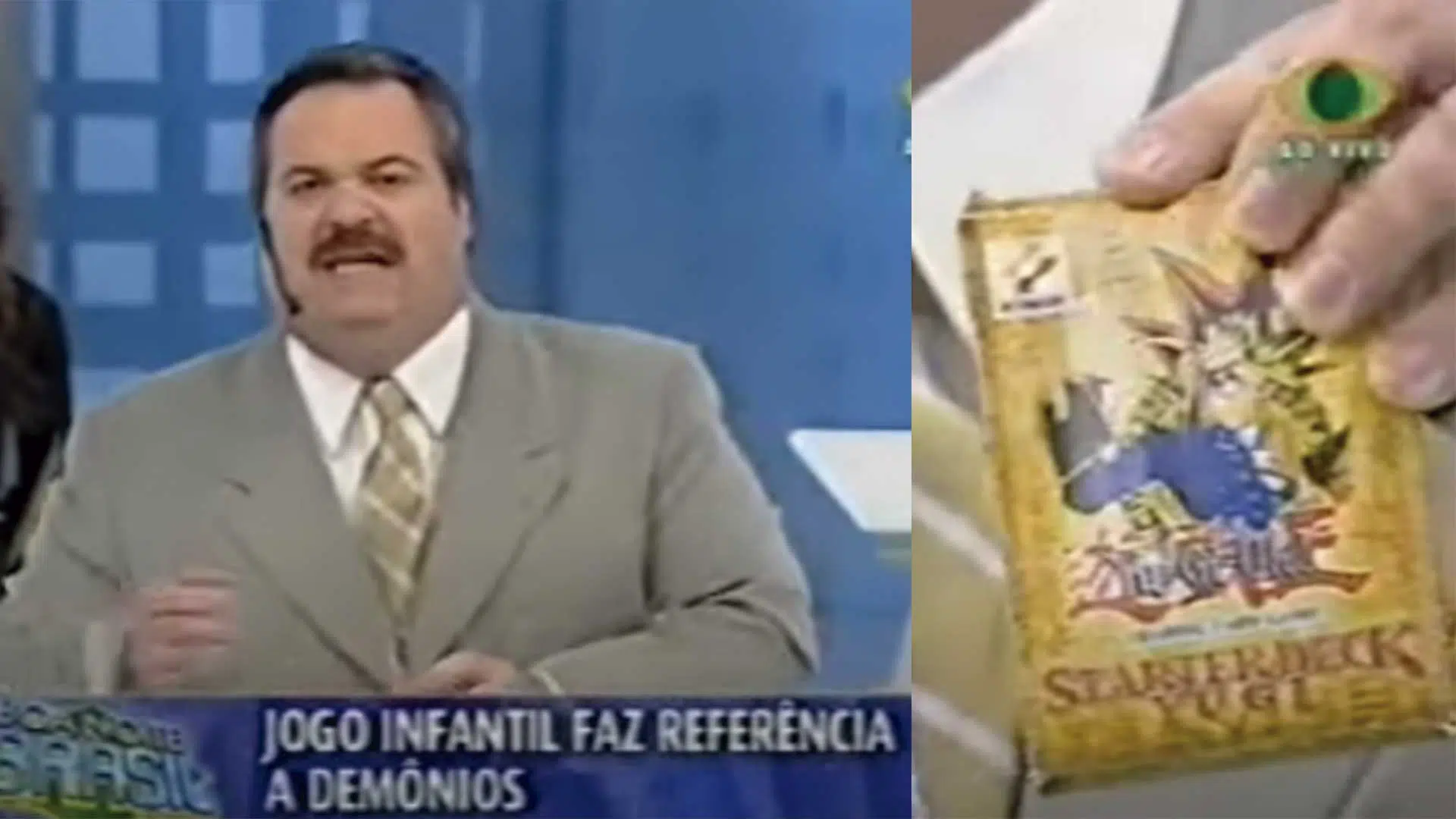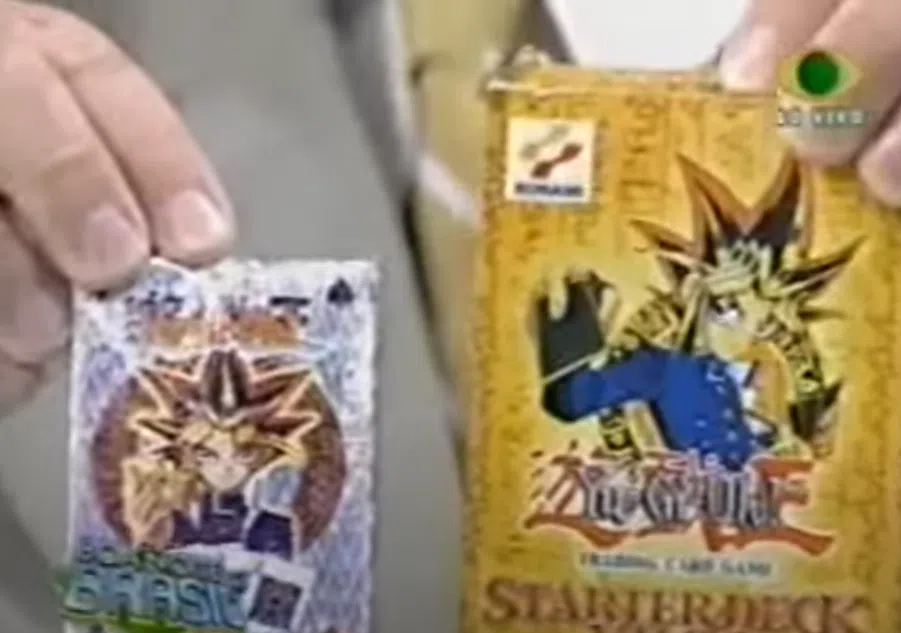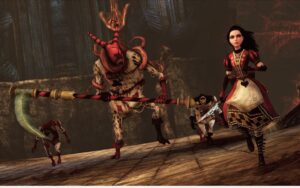
Those who experienced TV in the 1990s and 2000s remember that controversies, fantasy narratives and the search for an audience at any cost were just another normal day. Everything was tried, some of these attempts fell directly into the pit of the worst moments on Brazilian TV, such as the false interview with members of the PCC shown on the Gugu program in September 2003, others ended up dividing public opinion at the time and became moments that today many remember it with good humor.
A striking example of this second category were the editions of the program “Good Night Brazil”led by Gilberto Barros na Band, which classified Yu-Gi-Oh! as “the devil’s thing”. It is this second section of memories that we will talk about here today. Particularly, something that I laughed a lot, rewatching.
The program that demonized Yu-Gi-Oh!
Excerpts from the legendary editions of the program went viral on the internet “Good Night Brazil”presented by Gilberto Barros na Band, in which he uses a completely alarmist tone to say that Yu-Gi-Oh was something of the devil. He even uses this exact term: “This is the devil’s work.” The program also extended the discussion to other Japanese works, focusing on the issue of violence in the drawings.
It was June 2003, Yu-Gi-Oh already had a captive audience at that point. Avid not only for the anime, which began airing on open TV in January of that year, on TV Globinho, but also for the game cards. And Barros’ program helped to amplify this.
Sensationalism on TV
The theme was a full plate for a nightly program to fall on top of and tie the cards to a catastrophic narrative, capable of captivating the viewer, while the director keeps the presenter excited with the Ibope numbers minute by minute.
Gilberto Barros was an expert at this type of driving. The presenter, with experience in police programs, knew very well how to wrap the emptiness in a decoration that could attract attention. Other crazy topics, such as running LPSs in reverse, in search of subliminal messages, also appeared in their programs. It was the open TV game. A free-for-all that ranged from ET Bilu stuff to the Yu-Gi-Oh card scam.
If both the anime and the TCG Yu-Gi-Oh were remarkable for an entire generation of Brazilians, Gilberto Barros’ program bringing down the heat on the work was also, for other reasons.
Repercussion and consequences
Considering the strength that open TV had in 2003, try to imagine how many parents filled their children’s ears with the speech they saw on the program. This helps explain the rapid viralization of videos from this program now on the internet. Millions of Brazilians remember that moment well.
Evidently, the program turned to so-called experts, people who gave a helping hand in supporting the narrative that the program wanted to sell. One of these people was a theologian, who claimed that Yu-Gi-Oh “he taught black magic, he taught children to solve their problems in a duel, by hanging their arms”.
He even correlated the game with traffic fights: “We can see this in traffic, when there is a horn, the person gets out and shoots the other person in the head.”
The program also weighed in on the editing, filming a child playing on his PlayStation and uttering the phrase “I’m going to kill.”
In an interview with the report, a mother, after watching one of the editions of the program about the controversy surrounding Yu-Gi-Oh, associated that the fight between her two young children, complete with punches and slaps, was related to the game . It’s all the fault of those “demonic letters”.
It was a real saga. Gilberto stirred the news with all this controversy. Stories from the time echoed what was said on his programthe anime went off the air on open TV in 2004.
In January of that year, the Ministry of Justice classified the animation, following a request from the Public Prosecutor’s Office, as inappropriate for children under 12 years old, which made it impossible to show it before 8 pm, as it contained mild violence. On cable TV, through the Nickelodeon channel, the anime continued to be shown. Still in 2004, the film arrived in Brazilian cinemas “Yu-Gi-Oh: The Movie”.
Barros even said on the program that some people wrote to him, via email, that he was exaggerating, that it wasn’t quite like that, but the presenter said he preferred to err on the side of excess and quickly raised his tone, looking for a letter that was on his pulpit and being categorical: “The devil is here, oh!” And children as young as two and a half are being trained by this deck to perform black magic.” All governed by a background track that would give even Alfedh Hitchcock goosebumps and with the following GC: “Children’s game makes reference to demons.”

It wasn’t the production, much less Gilberto Barros, who observed how this issue could be a big deal in the search for an audience on TV. Churches had already started this movement against the game and the anime. It was only a matter of time before some program amplified the discourse.
As in many other cases, the buzz around the issue increased its support. Yu-Gi-Oh was gaining more and more fans. More and more people playing and watching anime, and piracy is rampant. Undoubtedly, a pillar for the game to become the craze it did in Brazil.
Entering into this game through legal means was not easy. Convincing parents to spend around R$60 on an original deck was an almost impossible mission, but alternatives were everywhere. Cards that many didn’t even play in the way they were designed, moving on to something less complex, like the breath game.

Gilberto Barros recalled the subject in 2017
In 2017, Gilberto Barros remembered the episode on his YouTube channel. He stated that he was not to blame.
“People didn’t understand the message I wanted to give through this, respecting, especially, children. Just that, just that.”
He also recalled that the competition on the topics ended up taking the agenda for his program. “We started calling in specialized people and they started to grow the business.”
Gilberto also knows that many of those who were children or teenagers at that time abhor him due to the repercussion of the themes in the program. Many ended up having their cards destroyed by their parents.
The presenter says that everything was done to try to improve the youth and children of Brazil. “I have nothing against these cards, it is a game, in fact. My concern was that the little one wouldn’t be able to understand the game. It was just that”added the presenter.
Source: https://www.hardware.com.br/artigos/yu-gi-oh-gilberto-barros/


